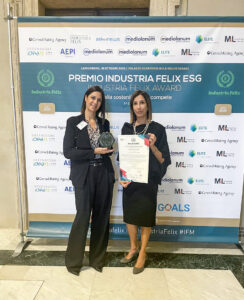Italy lagging behind in Gender Equality: Paradisi launches a new corporate inclusion system
In recent years, the European Union has made significant strides in promoting gender equality within both public and private organizations. However, Italy still lags behind. According to the European Institute for Gender Equality, the country scores just over 63 out of 100 in the gender equality index, placing it four points below the EU average and more than twenty points behind Sweden, which holds the highest score.
To address this gap, in July 2021, Italy introduced the National Strategy for Gender Equality 2021–2025, inspired by the EU’s Gender Equality Strategy 2020–2025. This strategy is closely linked to the National Recovery and Resilience Plan (PNRR) and includes Law No. 162 of November 5, 2021, on pay equity.
Determined to contribute to greater inclusivity, Paradisi has taken proactive steps. Over the past months, we have updated our Integrated Management System manual and procedures, adhering to the guidelines outlined in UNI/PdR 125:2022 “Guidelines for the Gender Equality Management System” and UNI ISO 30415:2021 “Human Resource Management – Diversity and Inclusion.” These guidelines align with Goal 5 of the United Nations 2030 Agenda for Sustainable Development.
The objectives of Paradisi Srl’s Inclusion Policy are multifaceted and structured across work processes and employees’ life stages.
Our company is committed to ensuring:
•Equal career opportunities;
•Equal economic treatment;
•Work-life balance conditions tailored to different life stages;
•A work environment free from stereotypes, discrimination, and abuse;
•A corporate culture rooted in diversity and inclusion;
•Mitigation of biases in the recruitment process through mixed-gender evaluation teams.
With this new Integrated Management System, we aim to prevent and address discrimination, harassment, and abuse in the workplace, fostering an equitable, safe, and respectful environment. Promoting equal treatment and educating employees on appropriate conduct are at the core of this commitment.
New procedures have been implemented to establish secure and confidential reporting channels for employees, investigate complaints, and take appropriate measures to protect workers and prevent further incidents. Examples of behaviors to prevent include:
•Sexually explicit or offensive comments;
•Unwanted sexual advances or requests;
•Non-consensual physical contact;
•Displaying sexually explicit images or materials;
•Sexual threats or coercion;
•Online or digital sexual harassment;
•Bullying or intimidating behavior based on gender, race, sexual orientation, religious beliefs, political views, health status, age, culture, etc.
Through these initiatives, our company seeks to set a positive example in promoting inclusion and gender equality within the Italian workplace. A small but significant step forward for society and humanity as a whole.






